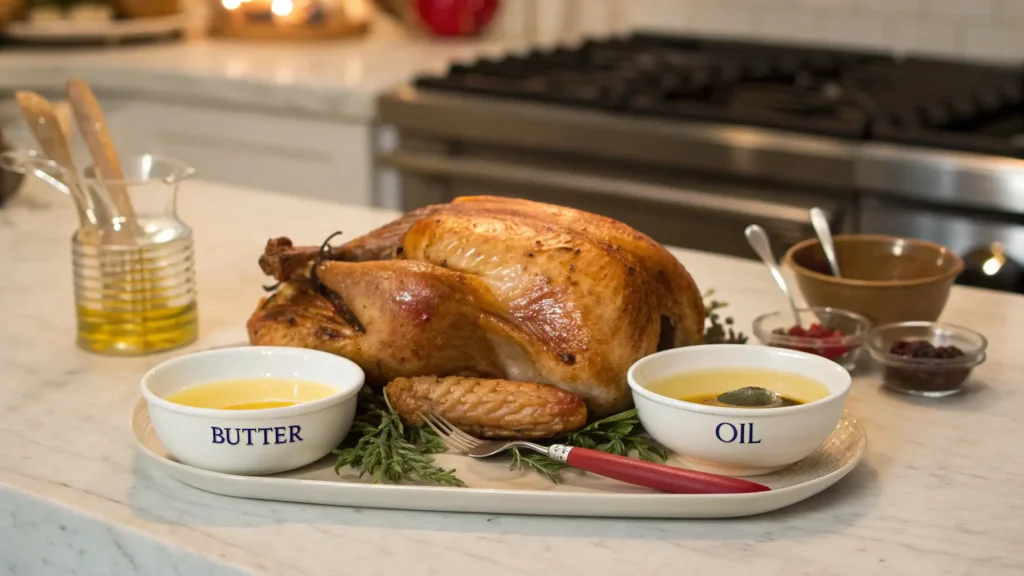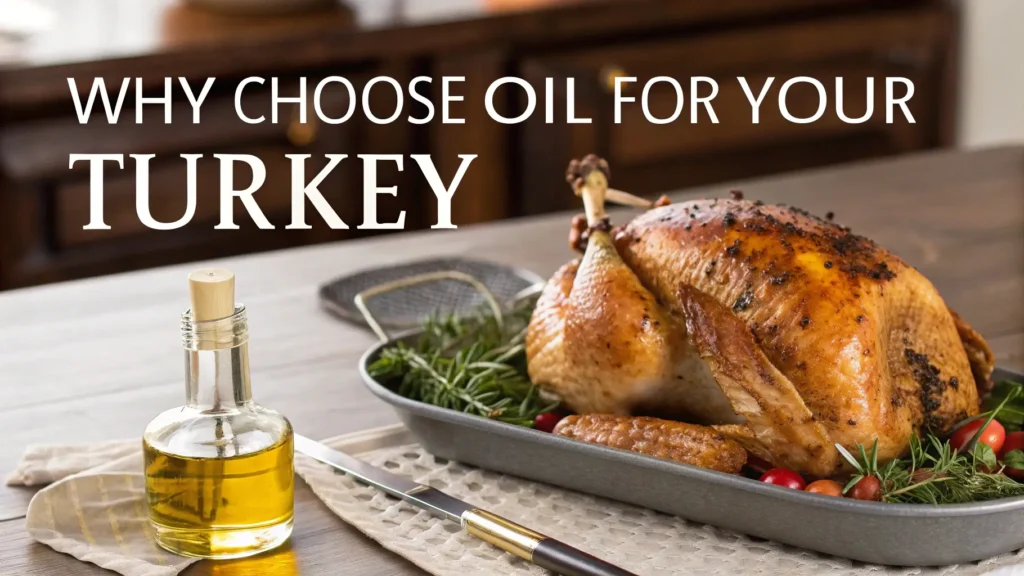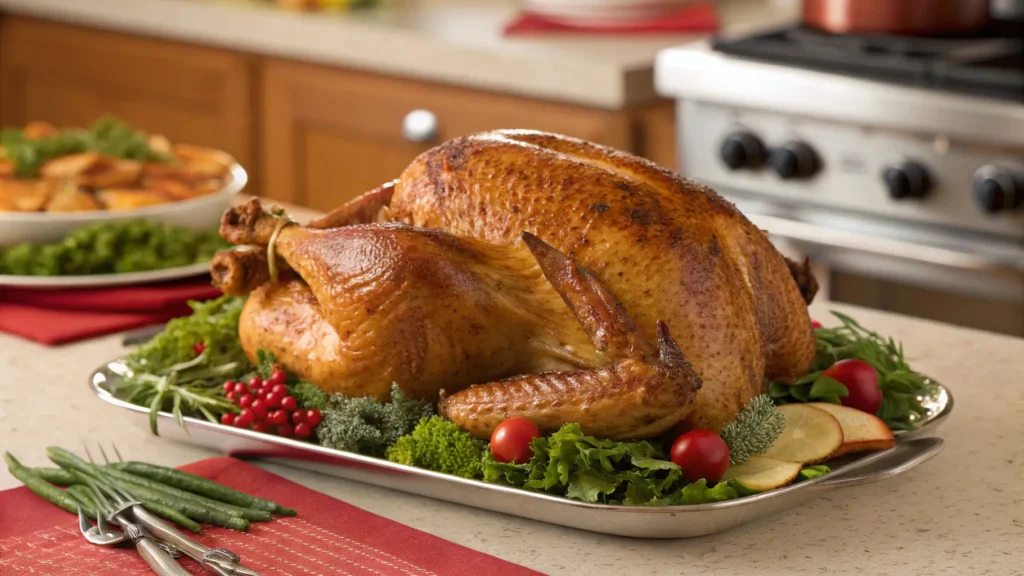When it comes to preparing a show-stopping turkey, many home cooks wonder, “Should I rub butter or oil on my turkey?” This age-old debate often stirs up confusion, but the answer lies in understanding what each option brings to the table. Butter adds rich flavor and locks in moisture, while oil ensures a crispy, golden skin. This guide dives into the pros and cons of both, helping you decide how to make your holiday turkey unforgettable.

When it comes to preparing a show-stopping turkey, the age-old debate of butter vs. oil often leaves home cooks scratching their heads. Both have their merits, and choosing the right option can make or break your holiday centerpiece. This article dives deep into the benefits and drawbacks of using butter or oil (or both!) on your turkey, providing tips and insights to help you create a golden, crispy, and flavorful bird that everyone will rave about. Let’s settle this debate once and for all, shall we?
Introduction to Turkey Preparation
Why Turkey Preparation Matters
Ah, turkey—the pièce de résistance of any Thanksgiving table. But preparing a turkey isn’t just about tossing it in the oven and hoping for the best. The right preparation techniques can transform your bird from dry and bland to juicy and flavorful. With so much riding on this dish, understanding the role of butter and oil is crucial.
The Role of Butter and Oil in Roasting
Butter and oil serve as the unsung heroes in turkey preparation. These fats not only add flavor but also impact the crispiness of the skin and the juiciness of the meat. Butter, known for its richness, brings a touch of decadence, while oil, with its higher smoke point, ensures evenly browned, crispy skin. Choosing one—or both—depends on your taste preferences and cooking goals.
Popular Preferences: A Look at Tradition vs. Innovation
Traditionally, herb butter rubs have been the go-to choice for many families, offering a savory blend of flavors. However, recent trends favor oil for its simplicity and no-fuss application. For adventurous cooks, combining the two has become a modern favorite, blending the richness of butter with the practicality of oil.
With this foundation laid, let’s explore each option in depth, starting with the classic choice—butter!
Exploring Butter for Turkey
The Benefits of Butter
Butter has long been the star of turkey preparation, and it’s easy to see why. Its rich, creamy flavor enhances the natural taste of the bird, creating a decadent, melt-in-your-mouth experience. Butter also acts as a fantastic moisture lock, keeping the meat juicy and tender during cooking. When applied under the turkey skin, it delivers flavor directly to the meat while helping the skin crisp up beautifully.
Moreover, using herb butter—a mix of butter and fresh herbs like thyme, rosemary, and parsley—adds an aromatic, savory profile to your turkey. But here’s the catch: while butter is fantastic for flavor, it’s not without its challenges.
Drawbacks of Using Butter
One potential downside to butter is its low smoke point, which means it can burn if your oven temperature is too high. This can result in uneven browning or even blackened spots on the turkey skin. Butter can also be tricky to spread evenly, especially if it’s cold or not properly softened. If you’ve ever asked, “Should I rub butter or oil on my turkey?” this drawback might make you lean toward oil.
How to Apply Butter to Your Turkey
For the best results, make sure the butter is softened but not melted. Start by gently lifting the skin of the turkey and spreading a generous amount of butter underneath. This technique ensures that the flavors penetrate the meat. Next, rub the remaining butter on the outside of the skin for a golden, flavorful finish.
To elevate your turkey even further, try making an herb butter compound. Simply mix softened butter with garlic, herbs, salt, and pepper, then use it as your rub. Trust us, your guests will notice the difference!
Why Choose Oil for Your Turkey?

Advantages of Using Oil
Oil is a top contender in the turkey-prep debate for good reason. With its high smoke point, it’s perfect for achieving that coveted crispy, golden-brown skin. Unlike butter, oil won’t burn as easily, making it an excellent choice for high-heat cooking methods like roasting or grilling. Additionally, oil is incredibly easy to apply, requiring no softening or mixing.
Using oils like olive oil or vegetable oil offers another benefit: versatility. You can mix your chosen oil with spices, garlic, or citrus zest to create a flavorful coating that enhances every bite.
Downsides of Oil
Despite its advantages, oil does have some limitations. It lacks the depth of flavor that butter provides, which might leave some turkey aficionados craving more richness. Furthermore, oil doesn’t adhere to the turkey as well as butter, which can make seasoning uneven.
If you’re considering oil and wondering, “Should I rub butter or oil on my turkey?”, it’s worth noting that oil often works best for achieving crispy skin rather than deep flavor.
How to Apply Oil Effectively
Start by selecting a high-quality oil, such as extra-virgin olive oil or avocado oil. These options bring subtle flavor notes without overpowering the turkey. To apply, simply drizzle the oil over the turkey and rub it evenly across the surface. For added flavor, create a spice rub using paprika, garlic powder, or cayenne, and mix it into the oil before applying.
For those who love experimenting, combining oil with lemon zest, fresh herbs, or even a splash of balsamic vinegar can elevate your turkey’s flavor profile. This straightforward method ensures your bird is both tasty and visually stunning when it emerges from the oven!
Combination Approach: Butter AND Oil?
Best of Both Worlds: Combining Butter and Oil
If you can’t decide between butter and oil, why not use both? Combining these two ingredients can give you the flavor depth of butter and the crispiness that oil provides. This technique is especially popular among those who want to strike a balance between taste and texture.
When you mix butter with oil, you get the richness of butter without the risk of it burning. The oil’s high smoke point ensures even cooking, while the butter brings in its signature savory notes. Wondering “Should I rub butter or oil on my turkey?” This combo might just be the answer to your culinary conundrum!
Methods for Incorporating Both for Maximum Flavor and Texture
The best way to combine butter and oil is to use them strategically. Start by rubbing softened butter under the turkey’s skin to infuse the meat with flavor and moisture. Then, coat the outside with oil to ensure a crispy, golden finish. This two-step process allows each ingredient to shine in its own way.
Another option is to melt the butter and mix it with the oil before brushing it over the turkey. You can enhance the mixture with minced garlic, fresh herbs, or a squeeze of lemon for added zest. This method simplifies the application and guarantees an even coating.
For more turkey ideas, consider exploring recipes like the Creole Butter Turkey Breast Recipe, which combines bold flavors with classic preparation techniques.
Factors Influencing Your Choice
Cooking Method: Roasting, Smoking, or Frying
Your choice between butter and oil often depends on how you plan to cook your turkey. For high-heat methods like roasting or frying, oil’s higher smoke point is a safer bet. If you’re smoking the bird at a lower temperature, butter works well to keep the meat moist.
Skin Texture Preference: Crispy vs. Moist
Do you prefer a crispy skin that crackles with every bite or a softer, juicier texture? Oil is your best friend for crispiness, while butter excels at delivering tender, flavorful meat. Combining the two offers a balanced approach.
Health Considerations and Dietary Restrictions
Lastly, consider health and dietary needs. Butter is rich in saturated fat, which some may want to avoid, while oil provides healthier fat options like olive or avocado oil. For those seeking a dairy-free alternative, oil is an obvious choice.
Whether you choose butter, oil, or both, the key is to tailor your preparation to your preferences and cooking method. This way, you’ll get a turkey that’s not only delicious but also a crowd-pleaser at your holiday table!
Tips for Perfect Turkey Preparation

Additional Steps for a Juicy Bird
Want your turkey to steal the show? Start with brining. Whether you prefer a wet brine with saltwater and spices or a dry brine with just salt and herbs, this step helps the meat stay juicy and flavorful. Brining also ensures your seasoning penetrates deep into the turkey, not just on the surface.
Injecting marinades is another way to add flavor directly to the meat. Using a marinade injector, you can infuse your turkey with herb butter, garlic oil, or even citrus juices. This technique pairs well with both butter and oil rubs, creating a flavorful, moist bird.
Basting Practices
Basting is key to maintaining moisture during cooking, but overdoing it can disrupt the cooking process. If you’re wondering “Should I rub butter or oil on my turkey?”, the answer influences your basting technique too. For butter-based rubs, baste sparingly to avoid burning. With oil, you can baste more frequently since it handles heat better.
Timing is everything. Aim to baste every 30–40 minutes, using a brush or baster to apply the fat mixture evenly. This keeps your turkey flavorful without opening the oven too often and losing heat.
Temperature and Resting Guidelines
Finally, cook your turkey until it reaches an internal temperature of 165°F for the breast and 175°F for the thighs. After removing it from the oven, let it rest for at least 20 minutes before carving. Resting allows the juices to redistribute, ensuring a moist and tender result.
FAQs Based on Popular Queries
Can I Use Other Substitutes for Butter or Oil?
Absolutely! Alternatives like ghee, coconut oil, or even mayonnaise work well as turkey rubs. They each offer unique flavors and textures, catering to dietary restrictions or taste preferences.
What’s the Best Oil to Use for Turkey?
Extra-virgin olive oil and avocado oil are top choices due to their high smoke points and mild, complementary flavors. These oils help achieve that signature crispy skin while enhancing the turkey’s natural taste.
Should I Baste My Turkey During Cooking?
Yes, but moderation is key. Over-basting can cause temperature fluctuations, slowing down the cooking process. Focus on strategic basting for optimal results.
Does Butter or Oil Impact Cooking Time?
Not significantly. However, butter’s lower smoke point may require careful monitoring, especially during high-heat roasting.
For additional turkey inspiration, consider trying out recipes like the Creole Butter Turkey Breast Recipe. It’s a flavorful twist on traditional preparation!
Conclusion: Making the Right Choice
Final Thoughts on Butter vs. Oil Debate
When it comes to answering the question “Should I rub butter or oil on my turkey?”, the choice ultimately depends on your preferences and cooking method. Butter provides unbeatable flavor and keeps the meat moist, while oil excels at creating that irresistible crispy skin.
Encouraging Experimentation for Personal Preference
Why not try both? Combining butter and oil can give you the best of both worlds—a turkey that’s juicy, flavorful, and beautifully golden. Experiment with different rubs and techniques to discover what works for you. After all, the perfect turkey is one that suits your table and taste!

